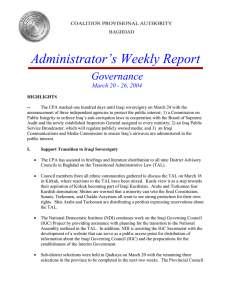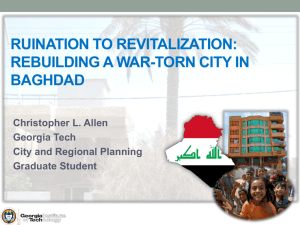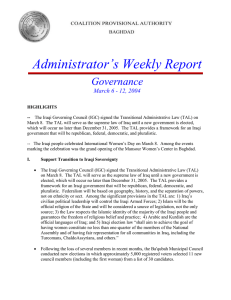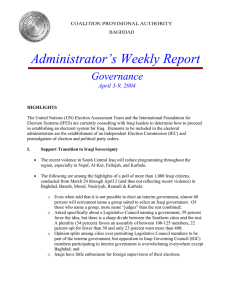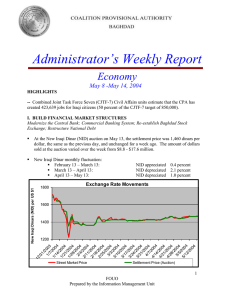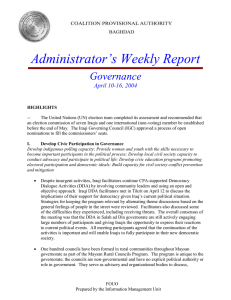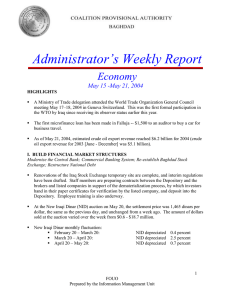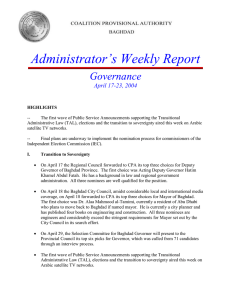Administrator’s Weekly Report Governance March 27 – April 2, 2004
advertisement
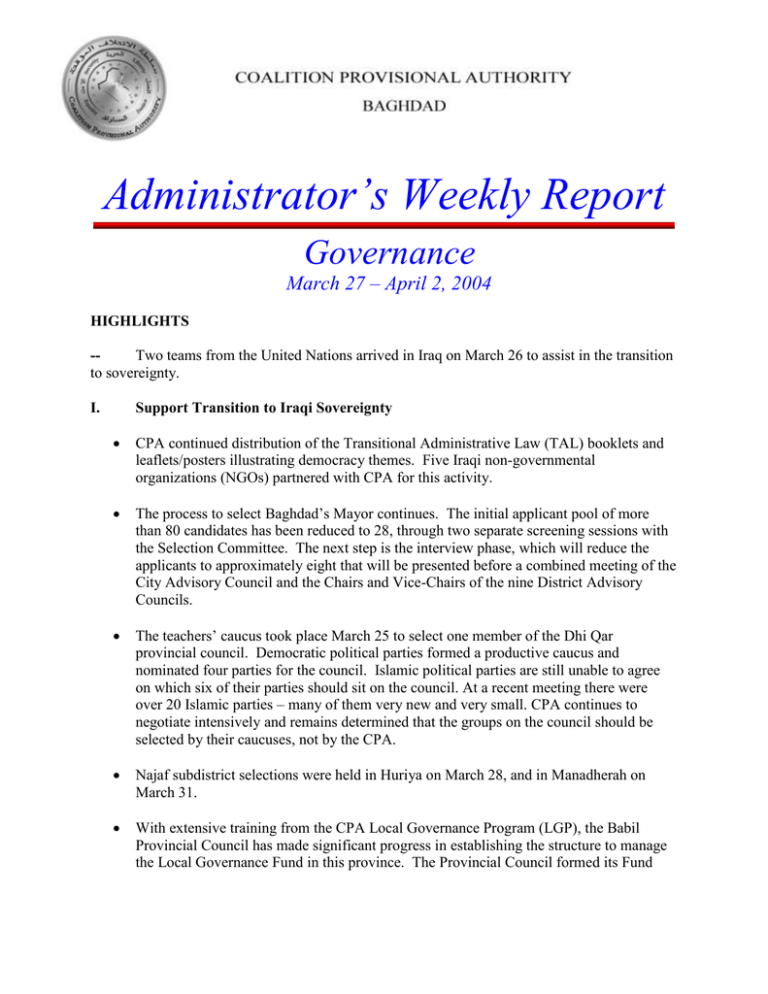
Administrator’s Weekly Report Governance March 27 – April 2, 2004 HIGHLIGHTS -Two teams from the United Nations arrived in Iraq on March 26 to assist in the transition to sovereignty. I. Support Transition to Iraqi Sovereignty CPA continued distribution of the Transitional Administrative Law (TAL) booklets and leaflets/posters illustrating democracy themes. Five Iraqi non-governmental organizations (NGOs) partnered with CPA for this activity. The process to select Baghdad’s Mayor continues. The initial applicant pool of more than 80 candidates has been reduced to 28, through two separate screening sessions with the Selection Committee. The next step is the interview phase, which will reduce the applicants to approximately eight that will be presented before a combined meeting of the City Advisory Council and the Chairs and Vice-Chairs of the nine District Advisory Councils. The teachers’ caucus took place March 25 to select one member of the Dhi Qar provincial council. Democratic political parties formed a productive caucus and nominated four parties for the council. Islamic political parties are still unable to agree on which six of their parties should sit on the council. At a recent meeting there were over 20 Islamic parties – many of them very new and very small. CPA continues to negotiate intensively and remains determined that the groups on the council should be selected by their caucuses, not by the CPA. Najaf subdistrict selections were held in Huriya on March 28, and in Manadherah on March 31. With extensive training from the CPA Local Governance Program (LGP), the Babil Provincial Council has made significant progress in establishing the structure to manage the Local Governance Fund in this province. The Provincial Council formed its Fund Committee, and CPA identified a Local Program Manager. The Governor and the Governorate Coordinator will comprise the Fund Board. Residents of the Babil District of Hashimiya elected a new council on March 24. Many had complained about the old council and we were told that the Da'wa Party had been campaigning heavily and were confident that they would be able to take over this body. However, the LGP local governance team reports that during the pre-election speech making, the Da'wa candidates appear to have alienated the electorate and as a result lost by a two-to-one margin. The CPA LGP facilitated the Al Muthanna Provincial Project Managers forum on March 26. This forum is comprised of the project manager from each district, the governorate project manager, CPA and LGP officials. Its aim is to coordinate the funds that pass through the Councils for capital investment projects, in particular the Local Governance Fund, which amounts to $1.5 million. LGP provided the training for the Councils on project proposal preparation, tendering, and financial accounting. Two teams from the United Nations arrived in Iraq on March 26 to assist in the transition to sovereignty. The electoral team, led by Dr. Carina Perelli, has developed a two-phase plan to prepare for next year’s election. Before June 30, the team must establish an independent electoral commission, draft election law, political parties law, and a law addressing media treatment of elections. The second phase consists of implementing this legislation. Logistical issues such as the identification and security of sites, and compilation of a voter registration list will be addressed. The second team, led by Ambassador Brahimi, will work to assemble an interim government. On March 28, the International Republican Institute convened a nine-member, male-only focus group in Baghdad to discuss the TAL. The group was one-third Christian and unusually pro-American. Among the more significant findings from the group are 1) the anti-TAL campaign has force - one member could cite his opposition to “Paragraph C of Article 61” but did not know the content of the paragraph; 2) persuasive young men are going door-to-door to collect anti-TAL signatures; 3) the group thought the anti-TAL brochure they were shown was “unconvincing” and the product of Islamic organizations; 4) The idea that the TAL is “anti-Islam” has strong resonance; and 5) the TAL is recognized as the first step in to Iraqi democracy and the departure of Coalition Forces. II. Develop Civic Participation in Governance Develop indigenous polling capacity; Provide women and youth with the skills necessary to become important participants in the political process; Develop local civil society capacity to conduct advocacy and participate in political life; Develop civic education programs promoting electoral participation and democratic ideals; Build capacity for civil society conflict prevention and mitigation Thirty women attended a democracy seminar in Baghdad on March 26 with Dr. Larry Diamond, CPA Senior Advisor on Democracy. Dr. Diamond discussed the next steps in 2 FOUO Prepared by the Information Management Unit the political process, now that the TAL has been signed, and identified points in the process on which women should focus to ensure their voices are heard and their goal of 25 percent representation in the new Iraqi government is reached. Iraqi Governing Council (IGC) members Dr. Raja Khuzai, Dr. Sallama Al-Khafaji, and a representative of Songul Chapook were in attendance. Ten political activists attended a seminar with CPA officials in Baghdad on March 30. The seminar was a more technical presentation on the upcoming electoral process, with discussions comparing types of elections and their impacts on gender representation. Representatives of the 1000 Women's Conference Group met with Ambassador Bremer in Baghdad on March 31, as part of a series of meetings between the Ambassador and leaders of national women's movements. The group presented the resolutions proposed after their February 12 conference. They are working for women's representation in government and for social issues such as employment for women, care for the handicapped, and allowances and support for ex-political prisoners, widows, and divorcees. The group has also expressed concern about the nature of other, less conservative women's organizations, believing they do not truly represent the majority of women in Iraq. They would like to hold an election in a subsequent conference to form a National Women's Committee as the official voice of Iraqi women. An ethnically mixed audience of more than 250 participants attended the Arbil Civic Forum on March 27. With a backdrop of the TAL logo, in both Arabic and Kurdish, a panel of three Arbil political leaders, including one woman, a Turkoman and an Assyrian, lead the forum. Among the participants were representatives from several, professional unions, political parties, civil society organizations, the faculty of Salah ad Din University, the Kurdistan Regional Government, the regional Parliament, and various ethnic, social, and cultural organizations. Though none of the main ethnic groups represented at the Town Hall – Kurds, Turkomen, Assyrians – expressed complete satisfaction with the TAL, they all recognized the document represented a major step on the road to Iraqi democracy in Iraq. More than 70 prominent residents and all local press attended Sulimaniyah’s first town hall meeting on March 28, which featured Iraqi Governing Council member Mahmoud Othman, Kurdistan Regional Government (Sulaimaniya) Prime Minister Barham Salih, women's rights activist Ala Talabani, and Patriotic Union of Kurdistan Politburo member Nershevan Mustafa as panelists. The meeting, which focused entirely on issues related to the TAL, lasted nearly two hours and was followed by a press conference. Three local television stations replayed the entire meeting. Azad Saddiq, the host of a local political talk show, moderated the event. Minister of Municipalities and Public Works Nasreen Barwari moderated Dohuk's Town Hall meeting on March 27. Security and territory issues were among the major audience concerns. On security, panelists and audience alike expressed their distrust of Arab motivations and thought the TAL's checks and balances insufficient. On territory, 3 FOUO Prepared by the Information Management Unit speaker after speaker – on the panel and in the audience – criticized the TAL for keeping terra irredenta out of Kurdistan. Speakers wanted to reclaim Kirkuk, Sinjar, and parts of Diyala through a non-voting process that would reverse Arabization. In meetings in Dhi Qar to discuss the TAL and other political issues, city council officials and prospective members of the Dhi Qar Provincial Council, objected to the fact that they had no ability to change the TAL. They strongly criticized a number of articles in the document, particularly what they referred to as the “Kurdish veto”. The National Democratic Institute (NDI) provided training in Baghdad on March 28, to fifteen NGOs on workshop planning and development as part of their weekly meeting to support Iraqi NGO development. The meeting sparked a debate between those agreeing that the workshops should be used to educate on the TAL so that their members can serve as more effective advocates, and those that prefer to use the workshops as a platform for opposition to the TAL. Most NGOs reported strong opposition to the law from their members. The Local Governance Program (LGP) hosted the fifth of six public forums in Arbil on March 27, on the region's economic development strategy. This week's forum focused on the role of education, from primary to vocational schools, in economic development. Participants identified key reform areas such as the establishment of curriculum standards, classroom size and teacher standards. LGP is gathering recommendations from the six forums for inclusion in the Arbil Economic Development Strategy, a formal document LGP will submit to the Kurdistan Regional Government later this year. III. Support Development of Sustainable Political Parties/Associations Support development of political associations Juwdat al-Obeidi, leader of the Iraqi Democratic Conference, organized a conference for 192 political parties and movements, civil society organizations and unions, March 27-29 in Baghdad. Twenty-one parties that attended NDI's workshops in Hilla in early March were represented, and the conference reflected several concepts that NDI had introduced in these previous training activities. The organizers adopted a more grassroots approach to coalition building through measures such as voter surveys conducted by rank and file members. Al-Obeidi adopted a more forward-looking agenda that addressed the concerns and needs of individual voters and how to reach out to important constituencies such as women, students, and pensioners. The conference also provided a useful measure of political issues that have particular resonance in the current environment. Security ranked highly, with participants calling for Iraqis to take responsibility for restoring law and order, accelerating the formation of the New Iraqi Army and for expelling foreign terrorist organizations. On governance issues, there was strong opposition to federalism and to articles of the TAL that outline minority rights. The National United Power Convention organized a conference as part of the effort by the Iraqi Democratic Current to develop a more broad-based coalition. The coalition 4 FOUO Prepared by the Information Management Unit includes several parties that received NDI training in both Tikrit and Baghdad, including the Iraqi United Party and the Iraqi National Gathering. IV. Initiate Public Sector Management Reform Assist development of Iraqi Civil Service Management and Training Plans; Promote ethical government, transparency, and the accountability of officials CPA developed the initial design for restructuring the Iraq Tax Commission (ITC) to modernize the tax collection system in accordance with international standards. The Iraq Tax Commission is currently structured by type of tax, such as small business, real estate sales, and wage deduction taxes. Reorganization plans thus far include shifting both the central office and major tax commission branches to functional offices based on different activities performed by the commission, such as tax processing, taxpayer assistance, collection, and auditing. The existing office structure as organized by types of taxes does not encourage transparency or accountability. Currently, each office’s broad authority over its particular tax makes abuses easy to conceal. V. Promote Respect for Human Rights Educate on Human Rights Issues; Preserve documentation of past atrocities, raise awareness, and promote reconciliation; Strengthen local capacity to investigate and address past atrocities; Iraqi Special Tribunal (IST) for past atrocities and Iraq Property Claims Commission for property disputes; Human Rights Incorporated into Laws; Develop Role of Independent Human Rights NGOs and Media; Establish a Human Rights Ministry The Iraqi delegation to the United Nations Human Rights Commission in Geneva announced Iraq’s intention to sign up to the 1984 UN Convention against Torture, which will prohibit the use of torture in Iraq and make it incumbent upon the Iraqi government to pass domestic legislation to this effect. VI. Promote Durable Solutions for Refugees and Internally Displaced Persons (IDPs) Facilitate the Return of Refugees and IDPs; Build Local and National Capacity to Protect and assist Refugees and IDPs; Develop and Implement a Process to Resolve Property Disputes The first meeting of the Inter-Ministerial Committee on Social Reintegration of Internally Displaced Persons (IDP) and Refugees was held on March 31 at the Ministry of Displacement and Migration headquarters. The Minister of Displacement and Migration chaired the event, which was attended by representatives of the Ministries of Housing and Construction, Labor and Social Affairs, Health, Planning, Foreign Affairs, and of the Municipality of Baghdad. Items on the agenda included housing requirements for IDPs, returnees, and the squatter issue, and medical care for returnees. The Inter-ministerial Committee agreed to hold monthly meetings. 5 FOUO Prepared by the Information Management Unit
